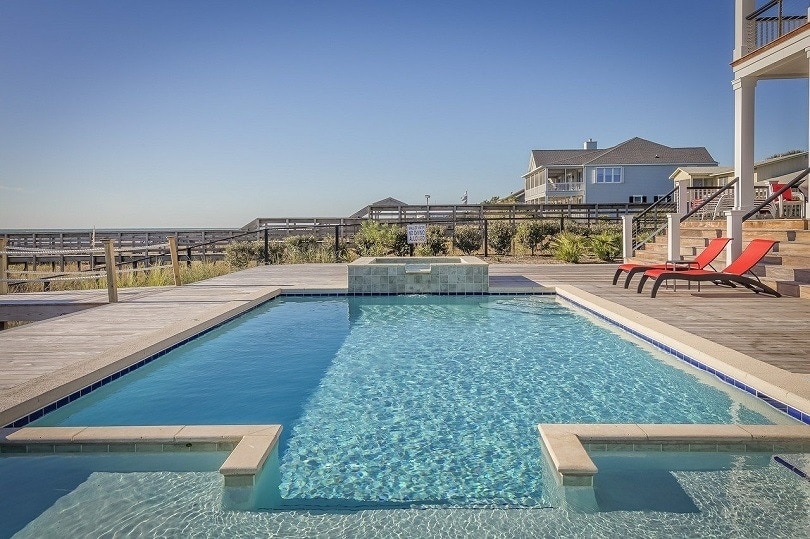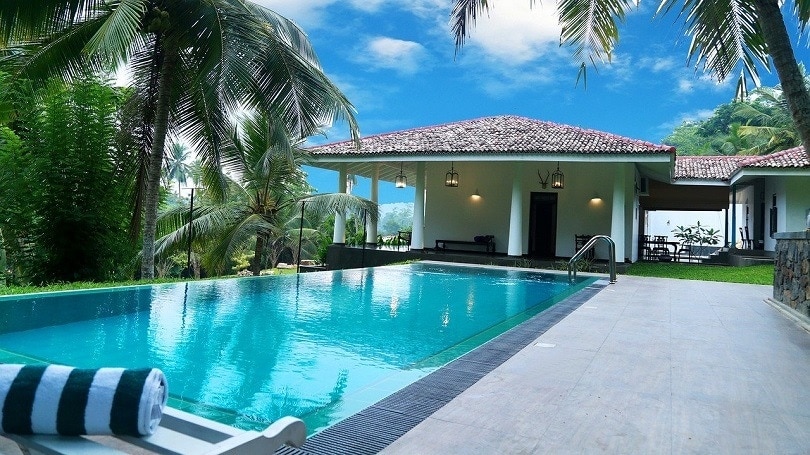Liquid Chlorine vs Chlorine Granules: The Main Differences
-
Pete Ortiz
- Last updated:

When you first learned to care for your pool, you probably were taught by a friend, family member, or professional. They likely introduced you to either liquid or granular chlorine, and you stuck with their recommendation. Through the years, have you ever wondered which is better? Does one option work better for your pool and your individual needs, or are all chlorines created equal?
Here is a quick and easy rundown on the differences between liquid and granular chlorine and which will work best for you.
Liquid Chlorine
Liquid chlorine is a very powerful way to clean your pool water and keep it safe for swimming for the entire summer. The pH level of liquid chlorine is right around 13, which is quite high. When adding something with an extremely high pH level, you will likely need to balance this out by adding acid to the water.
Liquid chlorine is most commonly used in commercial pools. The reasoning behind this is that it is available in large 55-gallon drums that can be poured directly into these large pools.
When communities and hotels need a cheaper and fast-acting solution, liquid chlorine is advantageous.
Although it is recommended to use a peristaltic pump when delivering liquid chlorine, it is generally acceptable to pour the chlorine directly in. Another factor to consider with liquid chlorine is that it is highly corrosive in this form, and it could cause some issues long term, especially in smaller pools.
All forms of chlorine contain cyanuric acid. However, the levels of cyanuric acid that liquid chlorine leaves behind can be quite a bit higher. Cyanuric acid can leave pool water cloudy and make chlorine overall less effective. If you are using liquid chlorine be sure to test your cyanuric acid levels from time to time.
Granular Chlorine
- In The Swim's granular chlorine is ideal for use in swimming pools, spas, fountains and water features
- Powerful sanitizing powder that destroys bacteria, breaks down contaminants and kills algae
- Calcium-Free formula keeps hard-water pools sparkling clean and crystal clear
Granular chlorine comes with a pH of 7, making the pH/acid balance much more comfortable for a homeowner to deal with than the pH of 13 that the liquid chlorine has. Granular chlorine comes in three different types.
Di-Chlor
- BENEFITS: Destroys organic contaminants to maintain clean, clear, sanitized water; helps control algae growth
- USE: Specifically formulated for spa and hot tubs; can be used as a shock treatment
- COMPATIBILITY: Chlorine sanitizing systems
This form of granular chlorine has a pH of 7. It is highly effective and the most expensive of three types of granular chlorine (which are all more costly than the liquid). Di-Chlor does an excellent job of stabilizing the chlorine levels, and although it costs more, most pool owners find themselves using less of this than other alternative chlorine types.
Di-Chlor contains about 62 percent chlorine per pound. Some pool owners use Di-Chlor as an alternative to shock.
Lithium Hypochlorite
- One bag of this product per 10,000 gallons of water
- Adjust and maintain pH at 7.2-7.6
- Maintain total alkalinity in the range of 60 to 120
This form of granular chlorine has a pH of 11. Lithium hypochlorite only has about 35 percent chlorine per pound, so you will need a significant amount of it to keep your pool chlorine levels where they need to be. It is less expensive than the Di-Chlor, and it dissolves very quickly, almost like the liquid chlorine.
The lithium hypochlorite is gentle enough that if you had a pool day with lots of swimmers and feel the pool needs a slight boost, you can sprinkle some in. For vinyl pools, lithium hypocholite can help to keep the liner looking good and not bleaching it out.
Calcium Hypochlorite
- Fast-Acting Algae Control: Calcium Hypochlorite (Cal-Hypo) is an effective non-stabilized chlorine shock treatment, ideal for routine...
- Versatile Use: Suitable for above ground or in-ground swimming pools, spas, and hot tubs; Pre-dissolve or dilute to avoid bleaching the...
- High Chlorine Content: 65% available chlorine, provides powerful sanitization for crystal-clear water
The most popular type of granular chlorine available. Calcium hypochlorite is most popular among residential homeowners with pools because it can be both practical and affordable. The pH on this is 12, and it has about 65 percent chlorine per pound.
Indeed, this seems like it is the best option of all those that we have discussed. Calcium hypochlorite would be the hands-down winner for the best overall option except that it can be a bit dangerous.
It is very commonly used as a shock for pools, and it is unstable. The fact that it is unstable makes it very easy to get the chlorine in your pool too high. Calcium hypochlorite will likely be the least expensive option you find, but be sure to check chlorine levels often and be extra careful when handling this product.

How Do I Know Which Chlorine Option Is Best for My Pool?
The good news here is that you can’t make a wrong choice. All the chlorine types we talked about will effectively clean your pool and keep it safe for swimming. The main reasons people choose one option over another are the type of pool and price.
For large commercial swimming pools, liquid chlorine is going to make the most sense. It will get the job done the fastest and cheapest.
For residential pool owners, the tablet or granular form is easier to work with and will likely cause less follow up issues regarding acid and pH levels in your pool. Take careful consideration when deciding which type of chlorine to use that you are regularly checking the pool’s chlorine and pH levels.
Conclusion
If your pool has been clean, your pH and alkalinity levels on point and your chlorine always within range, we don’t recommend making any changes to the type of chlorine you are using.
However, if you are dealing with issues like chlorine being too high or vinyl liners bleaching out, it may be time to take a look at what you are using and reevaluate its effectiveness.
The most critical factor to continually keep in mind when dealing with chlorine is safety. These chemicals are necessary to help us enjoy a summer of swimming, but they are also incredibly dangerous when not handled properly. Best of luck getting that pool sparkling!
Featured image credit: Luxury pool by GregoryButler, Pixabay
Contents






